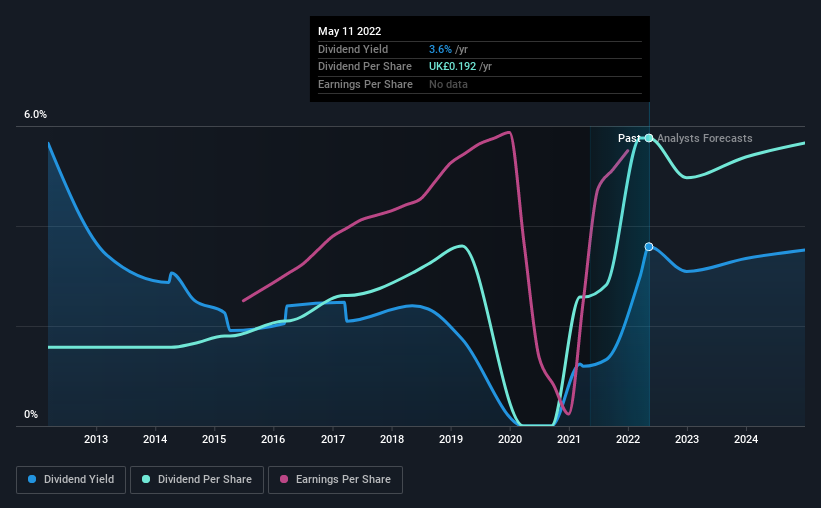Marshalls' (LON:MSLH) Upcoming Dividend Will Be Larger Than Last Year's
Marshalls plc (LON:MSLH) will increase its dividend on the 1st of July to UK£0.096. Even though the dividend went up, the yield is still quite low at only 2.7%.
See our latest analysis for Marshalls
Marshalls' Payment Has Solid Earnings Coverage
It would be nice for the yield to be higher, but we should also check if higher levels of dividend payment would be sustainable. Based on the last dividend, Marshalls is earning enough to cover the payment, but the it makes up 110% of cash flows. This signals that the company is more focused on returning cash flow to shareholders, but it could mean that the dividend is exposed to cuts in the future.
The next year is set to see EPS grow by 19.0%. If the dividend continues along recent trends, we estimate the payout ratio will be 55%, which is in the range that makes us comfortable with the sustainability of the dividend.
Dividend Volatility
While the company has been paying a dividend for a long time, it has cut the dividend at least once in the last 10 years. Since 2012, the first annual payment was UK£0.052, compared to the most recent full-year payment of UK£0.19. This means that it has been growing its distributions at 14% per annum over that time. Despite the rapid growth in the dividend over the past number of years, we have seen the payments go down the past as well, so that makes us cautious.
The Dividend's Growth Prospects Are Limited
With a relatively unstable dividend, it's even more important to evaluate if earnings per share is growing, which could point to a growing dividend in the future. However, Marshalls has only grown its earnings per share at 2.8% per annum over the past five years. Marshalls is struggling to find viable investments, so it is returning more to shareholders. This isn't bad in itself, but unless earnings growth pick up we wouldn't expect dividends to grow either.
We'd also point out that Marshalls has issued stock equal to 27% of shares outstanding. Regularly doing this can be detrimental - it's hard to grow dividends per share when new shares are regularly being created.
Our Thoughts On Marshalls' Dividend
Overall, we always like to see the dividend being raised, but we don't think Marshalls will make a great income stock. With cash flows lacking, it is difficult to see how the company can sustain a dividend payment. Overall, we don't think this company has the makings of a good income stock.
Companies possessing a stable dividend policy will likely enjoy greater investor interest than those suffering from a more inconsistent approach. Still, investors need to consider a host of other factors, apart from dividend payments, when analysing a company. For example, we've picked out 3 warning signs for Marshalls that investors should know about before committing capital to this stock. If you are a dividend investor, you might also want to look at our curated list of high yield dividend stocks.
Have feedback on this article? Concerned about the content? Get in touch with us directly. Alternatively, email editorial-team (at) simplywallst.com.
This article by Simply Wall St is general in nature. We provide commentary based on historical data and analyst forecasts only using an unbiased methodology and our articles are not intended to be financial advice. It does not constitute a recommendation to buy or sell any stock, and does not take account of your objectives, or your financial situation. We aim to bring you long-term focused analysis driven by fundamental data. Note that our analysis may not factor in the latest price-sensitive company announcements or qualitative material. Simply Wall St has no position in any stocks mentioned.

 Yahoo Finance
Yahoo Finance 
